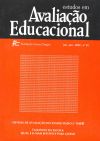O ENEM como forma alternativa ou complementar aos concursos vestibulares no caso das áreas de conhecimento Língua Portuguesa e Literatura: relevante ou passível de refutação?.
DOI:
https://doi.org/10.18222/eae02520022191Keywords:
ENEM/Exame Nacional do Ensino Médio, Verificação de resultados educacionais, Validade de conteúdo, Concurso vestibularAbstract
O artigo desenvolve reflexões sobre características de processos e sistemas de Verificação de Resultados Educacionais, bem como de Avaliação de Resultados Educacionais. Ratifica, argumentativamente, que o ENEM e os Concursos Vestibulares não caracterizam situação de avaliação de resultados educacionais, mas sim, e decisivamente, de aferição/verificação desses resultados. Nessa configuração, ambos constituem mecanismos seletivos sócio-educacionais para além da Educação Básica. À luz do objetivo fundamental do ENEM indica que, considerada a Área de Conhecimento “Língua Portuguesa e Literatura”, os itens das provas do ENEM 1998 - 2000 apresentam relativa ausência de Validade de Conteúdo. Desse modo, sugere que urge realizar investigações sistemáticas e abrangentes sobre a validade de conteúdo das provas do ENEM, relativamente a todas as Áreas de Conhecimento nela abordadas.Downloads
Downloads
Published
How to Cite
Issue
Section
License
Copyright (c) 2002 Estudos em Avaliação Educacional

This work is licensed under a Creative Commons Attribution-NonCommercial 4.0 International License.
Authors who publish in this journal agree to the following terms:
a. Authors retain the copyright and grant the journal the right to first publication, with the paper simultaneously licensed under the Creative Commons Attribution license that allows the sharing of the paper with acknowledgment of authorship and initial publication in this journal.
b. Authors are authorized to assume additional contracts separately, for non-exclusive distribution of the version of the paper published in this journal (for example publishing in institutional repository or as a book chapter), with acknowledgment of authorship and initial publication in this journal.
c. Authors are allowed and encouraged to publish and distribute their paper on-line (for example in institutional repositories or on their personal page) at any moment before or during the editorial process, as this can generate productive changes, as well as increase the impact and citation of the published paper (See The Effect of Open Access).





